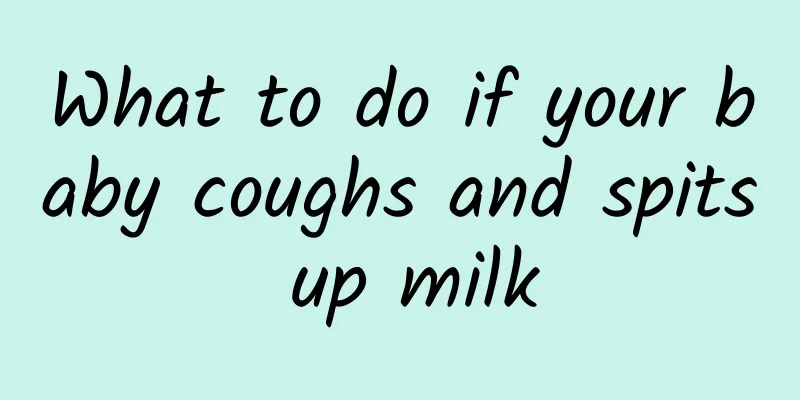What to do if your baby coughs and spits up milk

|
It is also common for babies to cough and spit up milk. If the feeding posture is improper, the baby may choke on milk, which will cause spitting up milk and coughing. We know that the baby's gastrointestinal capacity is relatively small, so they should eat small meals more often and not feed too much milk each time. Overfeeding may cause spitting up milk. If the child has an obvious cough, pay attention to the indoor temperature to prevent the baby from catching a cold. What to do if your baby coughs and spits up milk 1. Assist the baby to cough: If the baby coughs when awake, hold the baby up and stroke the baby's back. If the baby coughs when asleep, raise the baby's upper body and head a little, and let the baby sleep on the left and right sides alternately. This will help the discharge of nasal secretions. 2. Do not let a baby who is coughing lie down to sleep immediately after feeding to prevent vomiting due to coughing. 3. Let your baby inhale warm and humid air: the room temperature should be kept at 20℃, and the indoor humidity should be maintained at 60-65%. In dry winter and spring, you can use a humidifier in the room or hang wet towels in the room. 4. Use a hot water bottle to relieve cough: Fill the hot water bottle with hot water at about 40℃, tighten the lid, wrap the hot water bottle with a thin towel, and apply it to the baby's back near the lungs. This can speed up the expulsion of cold and quickly stop the baby's cough. Babies' coughing and spitting up are usually caused by colds. In addition to eliminating symptoms such as coughing and spitting up, the most important thing is to treat the baby's cold. How old does the baby have to be to stop spitting up milk? It is very likely that babies will spit up until six months of age, or even later. Parents should be mentally prepared, but this does not mean that the baby is sick, he may just be vomiting physiologically. Most babies will probably stop spitting up when they can sit up straight on their own, but there are a few exceptions, and this condition may continue until they are one year old. When the baby spits up milk, parents can take some protective measures to make life more comfortable: for example, when the baby is on you, put a towel on your shoulders or thighs, so that the baby will not dirty you when spitting up milk, and it will also be convenient to clean up the baby. What causes baby to spit up milk? Generally speaking, babies spit up a lot of milk, which can happen shortly after feeding or half an hour later. Before spitting up, the baby will open his mouth and stretch his neck, with an expression of pain and discomfort. Spitting up is a common phenomenon in infants and can be caused by the following reasons: 1. Disease factors: Vomiting may be a symptom of systemic or gastrointestinal diseases. If your baby loses weight rapidly due to spitting up, or coughs while spitting up, or the vomit is brown or green, or it is vomited in a jet shape up to 70-80 cm away, these are likely signs of a disease. Most babies are happy vomiters. If the baby vomits very uncomfortably, it is very likely that the esophagus is inflamed, and parents need to take the baby to the hospital for treatment in time. 2. Physiological factors: The anatomical and physiological characteristics of the infant's gastrointestinal tract make it easy for the baby to vomit up. This is because the cardia between the esophagus and the stomach has not yet matured, and the vomiting occurs due to the need to expel some mucous membrane remaining in the body. Spitting up due to physiological reasons is common. 3. Other reasons: The baby may also spit up milk because he eats too much and lies down immediately after feeding. This is all physiological spitting up, and parents don’t need to be too nervous. At the same time, be careful not to let your baby eat too much at one time. In general, if the baby spits up milk occasionally and is in good spirits, it does not necessarily mean that he is sick. But if the baby vomits several times in a row and vomits every time he is fed, parents should pay attention to whether the baby has a fever, the condition of his bowel movements, any changes in his spirit, etc. Because this indicates that the baby may have gastrointestinal problems or there may be lesions in other body systems, you need to take the baby to the hospital to find out the cause. |
<<: What to do if your baby coughs
>>: How long does it take to excrete the stone after taking the stone pellets?
Recommend
Dehumidifying Food
There are really a lot of people with sub-health ...
What medicine to take for Qi deficiency
There are more and more people suffering from qi ...
Symptoms of cough asthma
Cough asthma is a respiratory disease, which is g...
How to deal with swollen teeth
Swelling around the teeth is usually caused by gi...
Physiological proteinuria
This physiological proteinuria phenomenon is very...
Is there any harm in using an electric potential therapy device? What is the effect
I believe that many people often see potential th...
Gallstone medicine
The disease of gallstones mainly refers to the gr...
What to do if you have herpes in your throat? Parents should do this
The medical name for herpes in the throat is herp...
What should you pay attention to before donating blood?
Donating blood is a good public welfare behavior....
How to relieve a cough
In daily life, many people will suffer from sympt...
What Chinese medicine should I take for insomnia and tinnitus?
Insomnia and tinnitus can be said to be a very co...
Can moxibustion really treat gynecological diseases?
Using moxibustion patches to treat gynecological ...
TCM treatment of tinnitus, TCM massage for tinnitus
I believe that many people in life have experienc...
What are the health benefits of moxibustion?
Our country's traditional Chinese medicine is...
Hernia can cause big problems, don't ignore the bulge in your lower abdomen!!
When organs and tissues in the body leave their o...









